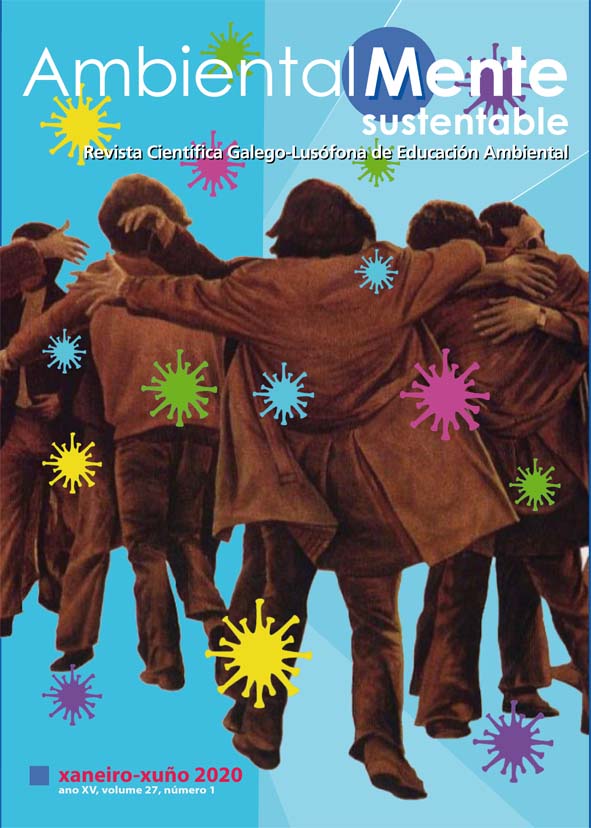Environmental Literacy: case study in a class from the 6th year of the 2nd Cycle of Primary School
DOI:
https://doi.org/10.17979/ams.2020.27.1.6648Keywords:
environmental literacy, climate change, environmental education, knowledge, environmentally friendly behaviorsAbstract
Environmental Literacy is an unavoidable subject in the century. XXI, for environmental issues, such as extreme climate change, which can be crucial in preserving biodiversity and quality of life on our Planet (Moreno & Mafra, 2019). In this way, there is an urgent commitment from “everyone” to promote more active and conscious action to solve current environmental problems and prevent future ones. Educating is an objective of society and in particular of the educational system (Sanches, 2011). The school constitutes a second “home” for future adults, so it presents itself as the most favorable environment in the acquisition of new skills, namely those related to Environmental Literacy, in a gesture of mutual respect between oneself and the other. The present work relates to a study of Environmental Literacy evidenced by a group of students who attend the 6th year of Basic Education. According to Spínola (2011, p. 290) citing Hungerford & Volk (1990) and Hollweg et. al. (2011), the conceptualization of Environmental Literacy includes the “mastery of four interrelated components: knowledge, dispositions, competences and environmentally friendly behaviors”. Of these four components, previously mentioned, two stood out, the objective of the study, knowledge and environmentally friendly behaviors.
Downloads
References
Bogdan, R. e S. Biklen (1994). Investigação qualitativa em educação. Porto: Porto Editora.
Câmara, A., et al. (2018). Referencial de educação ambiental para a sustentabilidade para a educação pré-escolar, o ensino básico e o ensino secundário. Lisboa: Ministério da Educação.
Direção-Geral da Saúde. (2004). Divisão de saúde escolar. Notícias saúde escolar, 1-4.
Direção-Geral dos Estabelecimentos Escolares. (2015). Referencial de educação para o risco. Lisboa: Ministério da Educação e Ciência.
ENEA (2017). Estratégia nacional de educação ambiental 2020. Lisboa: Agencia Portuguesa do Ambiente.
Fortin, M. F. (1999). Processos de investigação: da conceção à realização. Loures: Sociência.
Freixo, M. (2010). Metodologia científica: fundamentos, metodos e técnicas. Lisboa: Instituto Piaget.
Hill, M. e A. Hill (2009). Investigação por questionário. Lisboa: Edições Sílabo.
Ministério da Educação. (2017). Educação para a cidadania. Lisboa: República portuguesa- XXI Governo Constitucional.
Moreno, M. e P. Mafra (2019). Literacia ambiental: uma necessidade para a sociedade ambientalmente ativa. EDUSER: revista de educação, pp. 66-76.
Sanches, I. (2011). Do “aprender para fazer” ao “ aprender fazendo”: as práticas de educação inclusiva na escloa. Revista lusófona de educação, n. 19, pp. 135-156.
Sousa, M. e C. Baptista (2011). Como fazer investigação, dissertações, teses e relatórios segundo Bolonha. Lisboa: Lidel-Edições Técnicas LDA.
Spínola, H. (2011). Literacia Ambiental: um desafio à didática e à matemática. Funchal: Centro de Investigação em Educação, Universidade da Madeira.
Vaz, D. (2010). Alterações climáticas, riscos ambientais e problemas de saúde: breves considerações. II Seminário Ibero Americano de geografia física.
Downloads
Published
How to Cite
Issue
Section
License
The papers published in this journal are licensed under a Creative Commons Attribution-ShareAlike 4.0 International License.
Authors grant the right of first publication to the ambientalMENTEsustentable, which may publish in any language and format as well as publish and distribute their whole or partial content by any technologically available means and via data base.
Authors are allowed and encouraged to disseminate the articles accepted for publication on personal or institutional websites, before and after their publication, provided it is clearly stated that the work belongs to this journal and all bibliographic data are provided along with access to the document.



